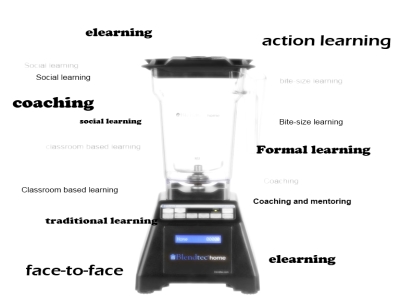Fresh from his lifetime achievement award win at the Learning Awards, Nigel Paine is back on site with an article extolling the virtues of content curation. Read on…
We all get it. There is masses of stuff out there, much of it open source. We know that. Just a cursory glance at iTunesU reveals a staggering amount of high-quality learning resources from some of the best universities in the world. But that is only scratching the surface. But, how do we get hold of it, store it, share it, validate it? Those apparently simple questions keep us back from a wide-scale embrace of great materials that are there for the asking which could potentially transform your learning at work or enable a self-learning dashboard for staff to access just in time resources.
I believe in a very simple mantra: curate first, create second. Use what is available before you build it yourself. And maybe we have got that opposition wrong as well. Perhaps it is not curation v creation but rather creation via curation. The genius is in the assembly of the bits, not the development of the pieces themselves. There are lots of personal tools to do this but sharing is difficult and therefore access is complex.
This dilemma keeps me occupied for hours on end. I want to be a curator, but I want to be a creator as well. I want to sift and edit, but also put my personal stamp on what goes out. I want to encourage others to do it too, but I want them to think about creation as well. I want to do this for myself, but make what I do available to others. In that mass of contradiction and indecision, I came across LearnFizz.
LearnFizz is really simple. Stage one, post links to great learning materials you have found that are freely available. Stage two, tag them so other people will be able to find them too. Then be creative: put your own mix of resources together and share the mix with other people. That’s it! It is fashionably in Beta, so you can suggest improvements and really road test the app. but it works and it is really straightforward.
 "I believe in a very simple mantra: curate first, create second. Use what is available before you build it yourself. And maybe we have got that opposition wrong as well. Perhaps it is not curation v creation but rather creation via curation."
"I believe in a very simple mantra: curate first, create second. Use what is available before you build it yourself. And maybe we have got that opposition wrong as well. Perhaps it is not curation v creation but rather creation via curation."I save material I come across by clicking my ‘instapaper’ button on my browser or clipping an article in Evernote. I have now assembled quite a collection of great resources that I have tagged and filed. That ability to capture an element of the enormous quantity of information that flows past me every day has now become second nature. LearnFizz adds one more element to that process and that is why I like it, and why I feel it has a role in the scheme of things.
But there is an element of LearnFizz that differentiates it from a simple list site (of which there are many) and that is its ‘Mix’ function. Any registered user can collect together different resources with a bit of annotation and post them for everyone to use.
This is a powerful idea and an obvious extension of the simple ‘list’. This is especially true when there is a large amount of choice. If I search for ‘presentation skills’ I get 741 hits. Hard to manage a list like this. But a great ‘Mix’ on presentation skills points me at four or five resources which I can work through in about an hour. A nice learning bite. If I trust the mixer, this is a huge short cut to finding something useful and structured.
This is a great way to kick start the curation process. There is nothing quite like it out there at the moment. It is not perfect: search can be erratic and I have found no way to delete a mix once it has been created but these do not detract from the overall impact. If we want to end up a ‘Curation Nation’ – in the words of Steven Rosenbaum – then this is a pretty good place to start.
Nigel Paine is a coach,mentor, writer, broadcaster and keynote speaker of international acclaim. He is currently working in Europe, Brazil, the US and Australia on a variety of assignments, that hinge around making work more creative, innovative and aspirational and making workplaces more conversational, team-based and knowledge sharing. You can read his blog or follow him on Twitter. He was given the Colin Corder Award recently at the Learning Awards 2012, for services to learning
Fresh from his lifetime achievement award win at the Learning Awards, Nigel Paine is back on site with an article extolling the virtues of content curation. Read on...
We all get it. There is masses of stuff out there, much of it open source. We know that. Just a cursory glance at iTunesU reveals a staggering amount of high-quality learning resources from some of the best universities in the world. But that is only scratching the surface. But, how do we get hold of it, store it, share it, validate it? Those apparently simple questions keep us back from a wide-scale embrace of great materials that are there for the asking which could potentially transform your learning at work or enable a self-learning dashboard for staff to access just in time resources.
I believe in a very simple mantra: curate first, create second. Use what is available before you build it yourself. And maybe we have got that opposition wrong as well. Perhaps it is not curation v creation but rather creation via curation. The genius is in the assembly of the bits, not the development of the pieces themselves. There are lots of personal tools to do this but sharing is difficult and therefore access is complex.
This dilemma keeps me occupied for hours on end. I want to be a curator, but I want to be a creator as well. I want to sift and edit, but also put my personal stamp on what goes out. I want to encourage others to do it too, but I want them to think about creation as well. I want to do this for myself, but make what I do available to others. In that mass of contradiction and indecision, I came across LearnFizz.
LearnFizz is really simple. Stage one, post links to great learning materials you have found that are freely available. Stage two, tag them so other people will be able to find them too. Then be creative: put your own mix of resources together and share the mix with other people. That's it! It is fashionably in Beta, so you can suggest improvements and really road test the app. but it works and it is really straightforward.
 "I believe in a very simple mantra: curate first, create second. Use what is available before you build it yourself. And maybe we have got that opposition wrong as well. Perhaps it is not curation v creation but rather creation via curation."
"I believe in a very simple mantra: curate first, create second. Use what is available before you build it yourself. And maybe we have got that opposition wrong as well. Perhaps it is not curation v creation but rather creation via curation."I save material I come across by clicking my 'instapaper' button on my browser or clipping an article in Evernote. I have now assembled quite a collection of great resources that I have tagged and filed. That ability to capture an element of the enormous quantity of information that flows past me every day has now become second nature. LearnFizz adds one more element to that process and that is why I like it, and why I feel it has a role in the scheme of things.
But there is an element of LearnFizz that differentiates it from a simple list site (of which there are many) and that is its 'Mix' function. Any registered user can collect together different resources with a bit of annotation and post them for everyone to use.
This is a powerful idea and an obvious extension of the simple 'list'. This is especially true when there is a large amount of choice. If I search for 'presentation skills' I get 741 hits. Hard to manage a list like this. But a great 'Mix' on presentation skills points me at four or five resources which I can work through in about an hour. A nice learning bite. If I trust the mixer, this is a huge short cut to finding something useful and structured.
This is a great way to kick start the curation process. There is nothing quite like it out there at the moment. It is not perfect: search can be erratic and I have found no way to delete a mix once it has been created but these do not detract from the overall impact. If we want to end up a 'Curation Nation' - in the words of Steven Rosenbaum - then this is a pretty good place to start.
Nigel Paine is a coach,mentor, writer, broadcaster and keynote speaker of international acclaim. He is currently working in Europe, Brazil, the US and Australia on a variety of assignments, that hinge around making work more creative, innovative and aspirational and making workplaces more conversational, team-based and knowledge sharing. You can read his blog or follow him on Twitter. He was given the Colin Corder Award recently at the Learning Awards 2012, for services to learning





